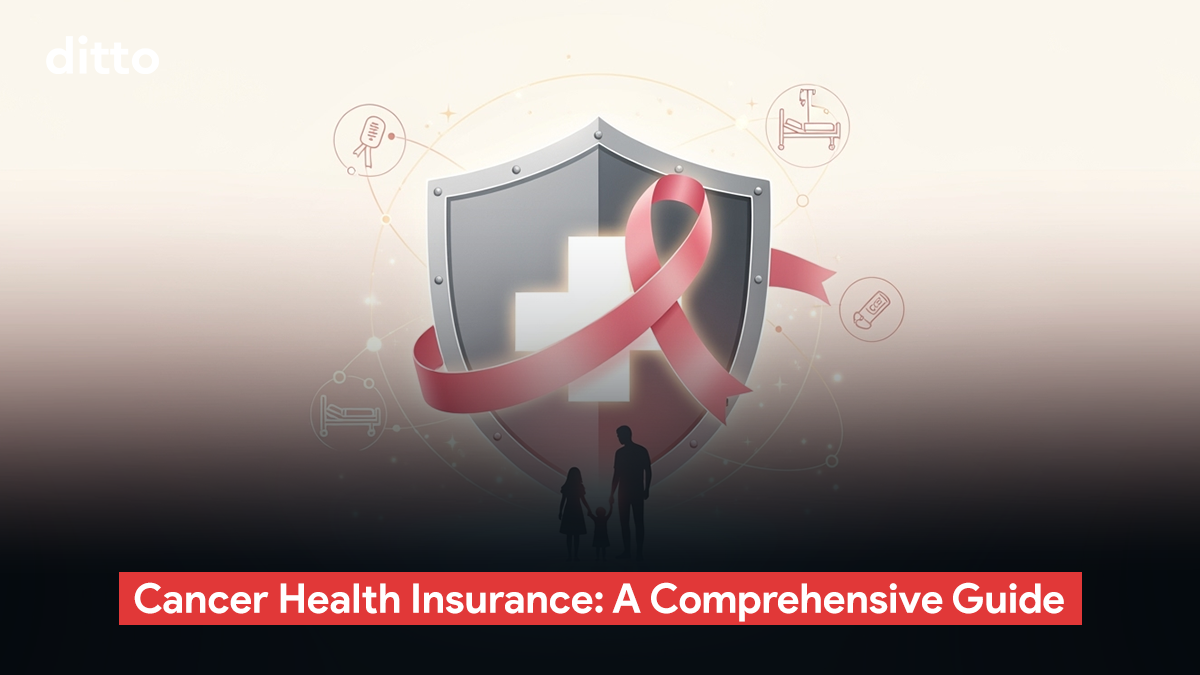In 2025, India is projected to see 1.57 million cancer cases, a staggering 12.8% increase compared to 2020.
Cancer isn’t just a health challenge; it’s a financial one too. From costly chemotherapy sessions to prolonged hospital stays, the expenses can drain life savings in months. That’s why having the right health insurance plan is not a luxury but a necessity; one that can protect both your health and your finances when life takes an unexpected turn.
Does Health Insurance Cover Cancer Treatment
Yes. Most comprehensive health insurance plans cover cancer treatment if the disease is diagnosed after purchasing the policy (i.e., not a pre-existing condition).
Coverage typically includes hospitalization, daycare procedures like chemotherapy and radiation, medication, diagnostics and pre- and post-hospitalization expenses as per policy terms. However, if cancer is a pre-existing disease, policy purchase application is usually denied during active treatment and considered only after remission, often with restrictions.
Don’t wait until it’s too late - book a free call with Ditto today and secure the right health insurance plan for cancer protection.
Who Should Consider Buying a Cancer Health Insurance Plan?
Cancer-specific plans or critical illness policies are designed for individuals who do not have cancer or any other major pre-existing disease at the time of purchase. These plans pay a lump sum amount upon diagnosis of cancer (or other listed critical illnesses), similar to the critical illness riders in term insurance plans.
For example, plans like HDFC ERGO Critical Illness Platinum or Aditya Birla Activ Secure work on this benefit-based model.
In India, around 100 out of every 1 lakh people are diagnosed with cancer every year. This statistic alone highlights why such coverage matters. However, it’s crucial to understand an important limitation:
Almost no health insurance plan will cover you if you are already suffering from cancer at the time of purchase.
That’s why buying a comprehensive health insurance plan before any diagnosis is essential. If the unspeakable disease strikes later, you will be financially protected. Waiting until after diagnosis will leave you with virtually no options for coverage.
The three most common types of cancers in India—oral cancer, breast cancer, and cervical cancer—are an integral focus of NPCDCS (National Programme for Prevention and Control of Cancer, Diabetes, Cardiovascular Diseases and Stroke).
That said, here’s an important note for Indian men: oral and lung cancers are among the most common forms in men, and many cases are linked to smoking or tobacco use. Even if diagnosed after purchase, treatment may not be covered if your cancer is directly linked to lifestyle habits like smoking or substance abuse, as insurers usually exclude such cases under the substance abuse clause.
In short:
- If you have no cancer or severe pre-existing condition now, buying a comprehensive health insurance plan (& a critical illness plan/rider additionally to serve as an income protection tool) makes sense for future protection.
- Don’t wait for symptoms—act early, because after diagnosis, coverage is practically impossible.
Want to understand cancer treatment options in India in more detail? Check out this quick explainer:
Can I Buy Health Insurance if I Have Cancer?
Yes, but the options are very limited. Standard health insurance plans will almost always reject applications from individuals recently diagnosed or currently undergoing cancer treatment. However, there are specific plans designed for such cases, though they come with major restrictions.
Two plans that come to mind are:
- The Star Cancer Care Platinum Insurance policy is a specialized health insurance plan designed for individuals who have already been diagnosed with cancer, covering medical expenses for both cancer-related and other illnesses
Coverage for existing cancer patients: The policy is specifically created for those with a pre-existing cancer diagnosis and provides coverage for all stages of cancer after a waiting period of 30 months.
There are no pre-purchase medical tests irrespective of age. The previous medical records, including details of treatment, are to be submitted along with the proposal. If you want more in-depth information about this policy, you can find that here in the policy wording. - Care Freedom – This plan may permanently exclude cancer depending on its severity, but allows cancer patients to avail coverage for other medical conditions. It’s a fair option for people who want financial protection for non-cancer-related treatments/ accidents after their diagnosis. If you want more in-depth information about this policy, you can find that here in the policy wording.
In short, while these plans can provide some level of financial relief, they are far from comprehensive and come with trade-offs. Let’s look at a few limitations:
- Co-payment on claims (you pay a share of every bill)
- Extremely low sum insured options
- Disease-wise sub-limits, which further restrict coverage
Will My Health Insurance Cover Cancer Diagnosed After Purchase?
Yes. If you were healthy and cancer-free at the time of purchase. Once these conditions are met, most comprehensive health insurance plans cover cancer treatment, including hospitalization, chemotherapy, and radiation, subject to the sum insured and policy terms.
Always inform your insurer promptly after diagnosis and get an acknowledgement/endorsement from them to avoid future claim disputes.
Real Stories: How Cancer Health Insurance Made a Difference
Case 1: Delayed Claim Approval Due to Non-Disclosure Allegation
1) Background: A policyholder was diagnosed with breast cancer and underwent surgery followed by chemotherapy at a reputed hospital. The total claim was approximately ₹6.5 lakh.
2) Issue: The insurer initially rejected the claim, alleging that the policyholder had not disclosed her history of thyroid issues at the time of purchase. They went back and forth on whether the thyroid condition was important for the insurer to assess risk accurately.
3) Resolution: Our team obtained medical records proving that the thyroid issue was mild and well-controlled, with no link to cancer. We escalated the matter with a detailed justification, citing IRDAI’s non-disclosure guidelines and clinical relevance. After that, the insurer approved the full claim amount after two rounds of negotiation.
4) Key Takeaway: Always disclose every past and existing medical condition, even if you think it’s minor. Misinterpretation and non-disclosure are among the most common reasons for cancer claim disputes. Misrepresentation/non-disclosure of other minor ailments can also cause issues with your cancer claim.
Case 2: Exclusion of Oral Chemotherapy Drugs
1) Background: A policyholder diagnosed with lung cancer opted for a modern treatment plan involving oral chemotherapy medication instead of traditional IV chemotherapy. The treatment spanned several months, and the total cost for medicines was around ₹4.2 lakh.
2) Issue: The insurer initially approved hospitalization costs but denied reimbursement for oral chemo drugs, citing an exclusion clause for “home treatment and oral medications.”
3) Resolution: We argued that oral chemotherapy is clinically prescribed and medically necessary for cancer care, and falls under modern treatment methods recognized by IRDAI. After escalation and multiple follow-ups, the insurer agreed to cover 80% of the drug cost, resulting in significant relief for the policyholder.
4) Learning for Customers: Not all policies automatically cover oral chemo or advanced cancer treatments. Before buying a plan, check for modern treatment coverage and drug coverage clauses.
Beyond private health insurance and personal planning, the government has also stepped in with dedicated programs to support cancer patients.
Government-Backed Efforts for Cancer Eradication
The Indian government has introduced several initiatives to ease the burden of cancer treatment:
- Ayushman Bharat – PMJAY: Eligible families get free coverage for chemotherapy, radiotherapy, and surgical oncology, with an emphasis on early treatment initiation.
- Health Minister’s Cancer Patient Fund (HMCPF): Provides financial assistance of up to ₹5–15 lakh at designated Regional Cancer Centres.
- Infrastructure expansion: Establishment of Day Care Cancer Centres and wider cancer screening (oral, breast, cervical) under NPCDCS to improve early detection.
Together, these measures aim to make cancer care more accessible and affordable, especially for vulnerable families.
“Dealing with cancer is overwhelming—don’t let the worry of medical bills add to it. At Ditto, we guide you to the right health insurance so you can focus on recovery, not paperwork.”
Cancer Health Insurance: Ditto’s Take
If you’re already diagnosed with cancer, retail health insurance choices are extremely limited. Your most practical protection is group cover via an employer, either your own or a family member’s policy, while you focus funds on treatment.
From the care-access side, there are free or highly subsidized options at major public/charitable centres such as Tata Memorial (Mumbai), AIIMS (New Delhi), Kidwai (Bengaluru), PGIMER (Chandigarh), and RCC (Thiruvananthapuram). Crowdfunding can also bridge immediate financial gaps when needed.
If you don’t have cancer today, the single best move is to buy a comprehensive health insurance plan now. Critical illness covers (benefit-based) only pay a lump sum on a new diagnosis after purchase, and generally aren’t available once you’re already ill. In short: use employer/group coverage and public schemes if you’re already diagnosed; otherwise, secure comprehensive insurance early so you’re protected if the unspeakable ever strikes.
Why Talk to Ditto for Your Health Insurance?
At Ditto, we’ve assisted over 8,00,000 customers with choosing the right insurance policy. Why customers like Abhinav below love us:

- No-Spam & No Salesmen
- Rated 4.9/5 on Google Reviews by 15,000+ happy customers
- Backed by Zerodha
- 100% Free Consultation
You can book a FREE consultation here. Slots are running out, so make sure you book a call now!
Conclusion
Cancer brings enough uncertainty on its own; your finances shouldn’t add to it. While treatment costs are rising, planning ahead with the right cancer health insurance can make all the difference. Whether it’s a comprehensive health plan or a critical illness policy, the key is timing: buy early, stay protected. Because when life takes an unexpected turn, financial security should be the last thing you worry about.
FAQs
Does the Ayushman card cover cancer?
Yes. Under the Ayushman Bharat Yojana, cancer treatment is covered for eligible beneficiaries, but the coverage amount is capped, and advanced treatments may not be fully covered.
Do Cancer Health Insurance Plans cover chemotherapy?
Yes. Most cancer-specific and comprehensive health insurance plans cover chemotherapy, radiation therapy, and other standard treatments, subject to policy terms and sum insured.
Are modern cancer treatments covered under Cancer Health Insurance?
Yes. Many leading health insurance plans now include modern treatments like robotic surgeries, targeted therapy, and immunotherapy. However, check your policy wording for sub-limits or exclusions.
Are stem cell procedures and immunotherapy covered?
Stem cell transplantation for cancer (like bone marrow transplant) and immunotherapy are covered under select cancer health insurance plans and critical illness policies. However, coverage is usually limited to medically necessary procedures and subject to terms, waiting periods, and sub-limits.
Does health insurance cover cancer from day one?
Generally, yes. Health insurance covers cancer if it is diagnosed after you’ve bought the policy. However, coverage begins only after the initial waiting period of 30 days (except in case of accidents).
Last updated on:










